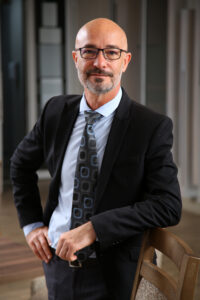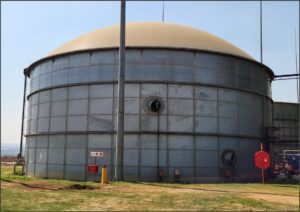Generating energy from waste is a concept that is finally gaining traction in South Africa. SRK Consulting was appointed by Bio2Watt Energy Holdings (BEH) to be the independent environmental consultants to undertake the requisite environmental permitting processes for a new biogas plant near Pretoria for industry pioneers BEH.
According to Darryll Kilian, partner and principal environmental consultant at SRK Consulting, this innovative project brings benefits in terms of producing much-needed energy while reducing landfill requirements and greenhouse gas emissions. The BEH organic waste-to-energy biogas plant will be located on a 5 ha site at Sunderland Ridge, west of Centurion, and will generate baseload electricity for the national grid.

(c) Jeremy Glyn
“The Sunderland Ridge biogas project is a great example of a project at the nexus of critical issues that face our society today, including how we manage our growing demand for energy, our increasing volumes of waste, and the reality of climate change – as well as food security,” said Kilian. “Operating as an energy producer by generating both electricity and gas, this facility will help the province face its landfill constraints while cutting methane emissions and creating natural fertiliser to promote organic agriculture.” The plant will process organic waste from the agriculture and food sectors to produce biogas, which will be converted into electricity for the national grid; the biogas will also be compressed and sold to an off take customer. The other product of the process is digestate – a quality fertiliser containing all nutrients and micronutrients necessary for modern farming.
Landfill alternative
A recent audit of landfill sites in Gauteng showed that the province faces a serious and urgent challenge with its traditional waste disposal methods. The audit found that there is very limited space remaining on existing landfill sites, and virtually no suitable locations or opportunities for new sites. Natasha Moodley, principal environmental consultant at SRK, noted that the project is a trailblazer in a game-changing global trend away from the traditional dumping of waste in landfill sites.
Circular green economy

Natasha Moodley, principal environmental consultant, SRK Consulting (c) Jeremy Glyn
“By diverting waste from a range of local sources, the plant will reduce the need for new landfills,” said Moodley, who is part of the SRK environmental team on this project. “This will make a valuable contribution to government’s mandate to reduce landfill development by 50% in the near future.” “At the same time, the conversion of methane to energy means a significant reduction in the volume of methane entering the atmosphere,” she said. “Methane is up to 80 times more destructive than carbon dioxide in its impact on climate change, so the plant pushes forward circular green economy efforts in Gauteng on an industrial scale.”
Problem solving with experience

Tamaryn Hale, principal environmental consultant, SRK Consulting (c)2014 James Howard-Davies

According to Tamaryn Hale, also an SRK Consulting principal environmental consultant involved in the project, the consultancy was contracted by BEH to conduct the environmental authorisation process, atmospheric emission license and water use licence application. Celebrating its 50th anniversary this year, SRK has considerable experience in these fields, and there were certain factors which added to the learnings gained in this project. “One of the findings of the environmental impact assessment (EIA) was the presence of an extensive dolomitic belt underlying the proposed area of construction,” said Hale. “This required various adjustments to be made to the design and planning – with solutions being developed through collaboration with several specialists, including a dolomite specialist engineer, process engineers and civil engineers. The process was also facilitated by close working relationships between SRK, our client and regulators.”
Heightened interest
The project’s opportunity to sell compressed gas also introduced the need for pipeline infrastructure, in turn triggering certain additional environmental licencing requirements. The combination of significant developmental benefits offered by the project has clearly generated the interest of all stakeholders. “It was heartening to see the interest and active response for this project from the various stakeholders,” said Moodley. “We received plenty of feedback and comments during the permitting phases – from the competent authorities, regulators and community members, as well as the Council for Geoscience – which greatly strengthened the EIA process.” In the public engagement process, for instance, local residents were enthusiastic to find out more about the project and its technology, and were generally very supportive of the project. Such engagements are a critical aspect of planning these developments, and of the project’s ongoing relationship with local stakeholders, Hale pointed out.
Global standards
“In addition to complying with South Africa’s robust regulations, the EIA was aligned with the International Financial Corporation (IFC) performance standard requirements,” she said. As part of BEH’s community upliftment programme, a stakeholder engagement plan and gender-based analysis were undertaken for the lifespan of the project. Moodley highlighted that these international standards also strengthened the environmental management plan (EMP), which stipulated the additional mitigation measures for the identified impacts. SRK’s multidisciplinary team was well utilised on the project, providing in-house expertise in various technical studies in the EIA – including social impact, surface water, climate change, air emissions and noise pollution. Kilian noted that the company also has an extensive network of professional associates whose fields were relevant to this project, such as heritage, major hazardous installations (MHI), human rights and gender impacts.
More to come
 The Sunderland Ridge project is the third such initiative from BEH, whose first plant has been operating in Bronkhorstspruit, Gauteng, for almost a decade. It has already contributed around 100 GWh to the national grid. Construction on a second plant – this one at Malmesbury in the Western Cape – is planned to start later this year, and is approved to produce 9,8 MW. “Biogas projects like these, with their energy and other benefits, hold great promise for a greener future in South Africa,” he said. “Technology to transform organic waste to biogas has been developing over the past couple of decades, allowing our economy to leapfrog to the latest technology. Our EIA has also shown that the impacts of these projects can be effectively managed, through quality studies, considered impact assessment and effective stakeholder participation.”
The Sunderland Ridge project is the third such initiative from BEH, whose first plant has been operating in Bronkhorstspruit, Gauteng, for almost a decade. It has already contributed around 100 GWh to the national grid. Construction on a second plant – this one at Malmesbury in the Western Cape – is planned to start later this year, and is approved to produce 9,8 MW. “Biogas projects like these, with their energy and other benefits, hold great promise for a greener future in South Africa,” he said. “Technology to transform organic waste to biogas has been developing over the past couple of decades, allowing our economy to leapfrog to the latest technology. Our EIA has also shown that the impacts of these projects can be effectively managed, through quality studies, considered impact assessment and effective stakeholder participation.”









